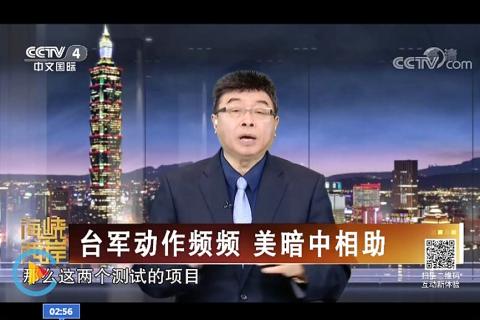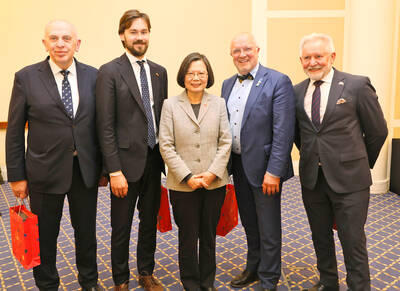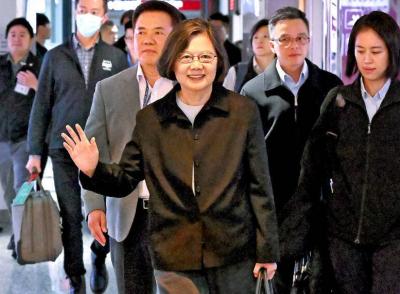The Mainland Affairs Council (MAC) yesterday said that it would launch an administrative investigation into whether it is illegal to produce programs for Chinese state-run media in Taiwan.
The council made the remarks after New Party legislator-at-large candidate Chiu Yi (邱毅) told reporters that his controversial China Central Television (CCTV) talk show was filmed in Taiwan.
The program is the only show on CCTV’s international Chinese-language channel that discusses Taiwanese affairs, and it has good ratings in China and overseas, the Wikipedia page for Chiu’s The Two Sides of the Strait (海峽兩岸) said.

Internet screen grab
Regulars on the show include Bernard Lai (賴岳謙), who oversees the online edition of the Chinese-language China Times, Shih Hsin University vice president Jack Yu (游梓翔), political commentator Tang Hsiang-lung (唐湘龍) and National Taipei University associate professor Cheng Yu-ping (鄭又平), according to Wikipedia.
Although his show is aired on CCTV, it is recorded in a studio in Taiwan, Chiu said on Thursday, adding that what he discussed on the show was either public information or commentary based on it.
On the show, he analyzed equipment on the navy’s Kao Hsiung LST-542-class tank landing ship and the nation’s deployment of missiles, and more recently critiqued the platform presentations that presidential candidates made on Wednesday, saying that President Tsai Ing-wen (蔡英文) was outperformed by Kaohsiung Mayor Han Kuo-yu (韓國瑜), the Chinese Nationalist Party’s (KMT) presidential candidate, who he said “caught Tsai off-guard.”
He also said that the US has encouraged Taiwanese independence groups by “having increasingly fewer qualms” about meddling in cross-strait issues, such as by reportedly flying two B-52s into the nation’s flight information region and advocating conducting port calls in Taiwan.
Local media organizations cooperating with the Chinese government to produce or air political programs — thereby furthering Beijing’s “united front” work — is an infraction of Article 33-1 of the Act Governing Relations Between the People of the Taiwan Area and the Mainland Area (台灣地區與大陸地區人民關係條例), the council said.
Articles 8 and 22 of the Telecommunications Act (電信法) give authorities the right to deny an online program’s access to frequency bands or ban it if its content is deemed disruptive or adverse to society, the council added.
Although local media organizations are not breaking the law if they lend their studios or equipment to Chinese journalists who are qualified to work in Taiwan, public figures should abide by the act when they are interviewed by Chinese media or engage in exchanges in China, and should not injure the nation’s dignity by making false statements, the council said.

Former president Tsai Ing-wen (蔡英文) on Monday called for greater cooperation between Taiwan, Lithuania and the EU to counter threats to information security, including attacks on undersea cables and other critical infrastructure. In a speech at Vilnius University in the Lithuanian capital, Tsai highlighted recent incidents in which vital undersea cables — essential for cross-border data transmission — were severed in the Taiwan Strait and the Baltic Sea over the past year. Taiwanese authorities suspect Chinese sabotage in the incidents near Taiwan’s waters, while EU leaders have said Russia is the likely culprit behind similar breaches in the Baltic. “Taiwan and our European

The Taipei District Court sentenced babysitters Liu Tsai-hsuan (劉彩萱) and Liu Jou-lin (劉若琳) to life and 18 years in prison respectively today for causing the death of a one-year-old boy in December 2023. The Taipei District Prosecutors’ Office said that Liu Tsai-hsuan was entrusted with the care of a one-year-old boy, nicknamed Kai Kai (剴剴), in August 2023 by the Child Welfare League Foundation. From Sept. 1 to Dec. 23 that year, she and her sister Liu Jou-lin allegedly committed acts of abuse against the boy, who was rushed to the hospital with severe injuries on Dec. 24, 2023, but did not

LIKE-MINDED COUNTRIES: Despite the threats from outside, Taiwan and Lithuania thrived and developed their economies, former president Tsai Ing-wen said Former president Tsai Ing-wen (蔡英文) on Saturday thanked Lithuania for its support of Taiwan, saying that both countries are united as partners in defending democracy. Speaking at a reception organized by the Lithuania-Taiwan Parliamentary Friendship Group welcoming her on her first visit to the Baltic state, Tsai said that while she was president from 2016 to last year, many Lithuanian “friends” visited Taiwan. “And I told myself I have to be here. I am very happy that I am here, a wonderful country and wonderful people,” Tsai said. Taiwan and Lithuania are in similar situations as both are neighbors to authoritarian countries, she

Former president Tsai Ing-wen (蔡英文) is to visit the UK during her ongoing European trip, which originally included only Lithuania and Denmark, her office said today. Tsai departed Taiwan for Europe on Friday night, with planned stops in Lithuania and Denmark, marking her second visit to the continent since her two-term presidency ended in May last year. Her office issued a statement today saying that Tsai would also visit the UK "for a few days," during which she is to meet with UK politicians and Taiwanese professionals, and visit academic and research institutions. Following Tsai's stop in Denmark, she is to visit the